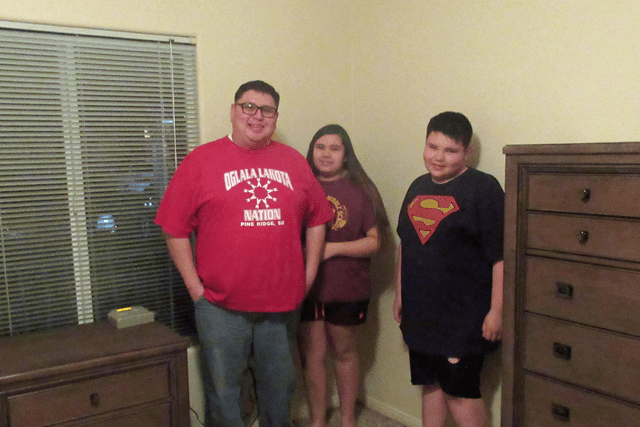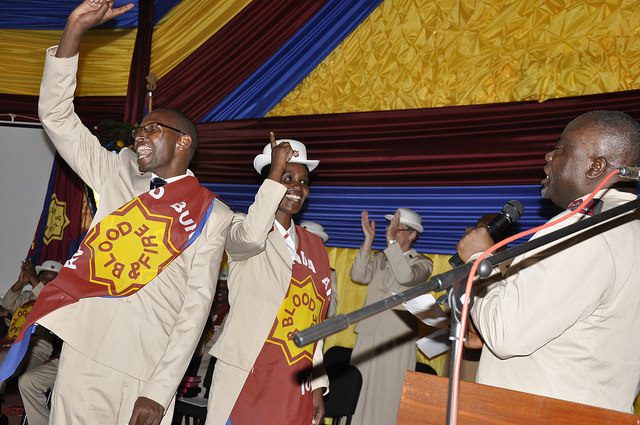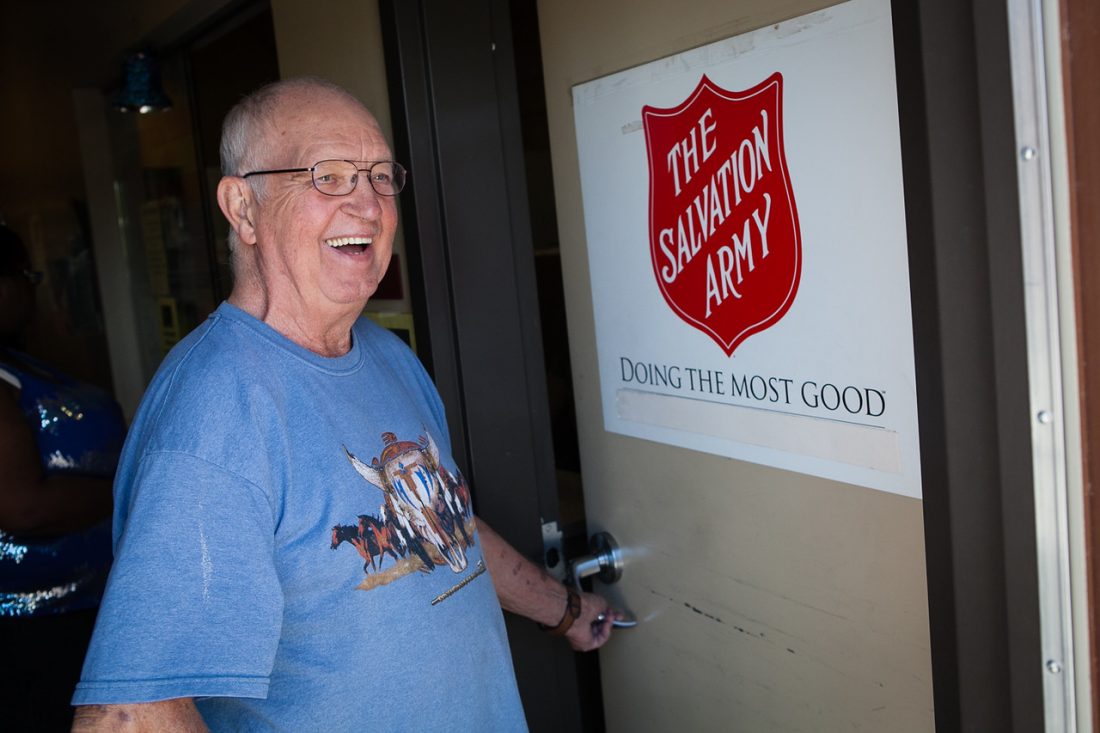Listen to this article
Listen to this article
Loading
Play
Pause
Options
0:00
-:--
1x
Playback Speed- 0.5
- 0.6
- 0.7
- 0.8
- 0.9
- 1
- 1.1
- 1.2
- 1.3
- 1.5
- 2
Audio Language
- English
- French
- German
- Italian
- Spanish
Open text
“extreme makeover” congo style. team from southwest division takes second trip to democratic republic of congo. by pene mathison –. fifteen volunteers from the southwest division recently completed a 21-day mission trip to kinshasa, in the democratic republic of the congo (drc)—the division’s partner in missions is the angola/dr congo territory. led by lt. colonels merv and shirley morelock, this was the second trip to help their partner renovate schools and to worship god together. kinshasa’s yolo primary school was in terrible condition, with leaking roofs, rotting timbers, broken concrete floors, filthy walls and broken down desks. it needed an “extreme makeover.”. the salvation army’s yolo school provides the only education in the area for children of very low or no income families. the 12 primary classrooms have two administrative offices and tow sets of teachers, for the morning session and the afternoon session. the school accommodates 300 students in the morning and another 300 in the afternoon. for this mission, the work projects were repairing and painting the yolo school and building 155 desk/benches for the children, along with painting and finishing the partially completed binza corps officer’s quarters. the team, led by lt. colonels merv and shirley morelock, was also invited to participate in various worship services. two years earlier—mbenseke school on arrival, the team visited mbenseke school, a new structure built by the 2005 southwest division team, replacing a stick and thatch school. several of the current team had worked on this project. when the two vans arrived for an unannounced visit, a crowd of children, teachers and parents who remembered them from the visit two years ago surrounded the team. one mother came with her two children currently enrolled in the school. she revealed that her two older boys could no longer attend because of lack of funds. they had two more years to complete their schooling. the need? just $100 per child, for the remaining two years. the team quickly took up an offering, and the headmaster was handed enough money so the two older boys could complete their education. on the previous visit, captain hector orellana of tucson south corps was honored when a newborn baby girl was named after him. now, on this visit, it was a proud “grandpa” who held 2-year-old hectorina. sunday worship and other meetings on the three sundays of the visit, team members divided into two brigades to participate in worship at different corps. the brigades ministered at yolo corps, binza corps, ndjali corps, kinshasa central corps and at mbenseke corps, where members of the 2005 team participated. the crowd there was so large that they had to meet outside in the new schoolyard. a memorable feature of the meetings was the leader, standing and shouting a hearty “hallelujah!” at least three times, with the whole congregation responding. music enhanced the services—enthusiastic bands and songsters who praised god with both salvation army and native songs. at each service numerous seekers approached the mercy seat. lt. colonel shirley morelock was keynote speaker at the opening rally of the month-long celebration of 100 years of the international home league. over 500 attendees responded to her message, “why women weep.” in a historic first, the home league celebration began with an open air meeting and parade, with music by the territorial band, through the streets of kinshasa. over 1,000 men, women and children heard music, testimony and statements of hope for the future as the message of salvation was proclaimed to people on the street. at the junior home league festival, captain diane mceaneney was keynote speaker. junior home league is comprised of young girls and teens who were interested in a more contemporary program. a group of young women—residents of the army’s ministry to prostitutes—attended the meetings; many came to seek the savior. at the katumbo training college, lt. colonel shirley morelock delivered a message, “vessels of honor,” to women leaders. lt. colonel merv morelock joined territorial commander commissioner stuart mungate, the staff band and territorial songsters in a special meeting of the african council for peace, where companies who have adopted policies advocating peace received awards. teams—work and other activities the mission team was split into three work crews. one crew was assigned the construction of the school desks, using a design created for the mbenseke school, called “banc pupitrie modele americain,” french for “the american model student desk.” to accomplish their task, this group set up an assembly line in the adjacent yolo corps building. they created 85 sturdy desks out of 16 pieces of pre-cut and sanded lumber, held together with 50 screws. each desk is designed to seat three children. at binza, the second crew completed the corps officer’s quarters—patching and sanding walls and door jambs, cleaning and replacing hardware, painting doors and interior walls, and installing curtain rods. after completing their work here, this team went to yolo school to scrape and paint the classrooms. the third crew did the daily grocery shopping, prepared meals, assisted with daytime meetings, wrote email letters to the team supporters and families back home and kept event photo records. lt. colonel merv morelock coordinated projects, worship schedule and administrative tasks. each team member was responsible for an evening group devotion. through this sharing, lifelong friendships were forged. the team experienced the salvation army’s child sponsorship program first hand. four children, two sponsored by the roswell corps and two by the phoenix adult rehabilitation center, enjoyed a home cooked american-style dinner. these children, with sponsorship support, attend school and receive all school supplies. currently 623 children are sponsored in the congo/angola territory. the cost is only $20 per month, per child. many children remain who cannot attend school because their parents are too poor and not enough sponsorships are available. final celebration and side trip the final weekend in the drc was a time of celebration. on saturday the team participated in the ribbon-cutting ceremony of the new, spacious binza corps quarters let by mungate and lt. colonel onal castor. the next afternoon, the team took part in the dedication of the completely renovated yolo school. guests included the kinshasa district provincial minister of education, the vice governor of kinshasa representative, a senator, several school officials, and the yolo area police captain. hundreds of salvationists attended, including the national songsters with their new hats (paid for by donations from southwest division musicians), the territorial staff band, and most of the territorial headquarters staff. on their next to last day, the team drove two hours over a bumpy, rutted dirt road, north to a remote village by the congo river. there they visited a small salvation army hospital, the only one in the area. this clinic, with no electricity in the village, powers its lights and equipment with solar energy and a small generator. there is no helicopter or ambulance service to transport critically ill patients to larger hospitals in kinshasa. many items, like sanitary gloves and gauze pads, are in constant short supply, and they have no x-ray or other diagnostic equipment because of the lack of electricity. the clinic serves a wide range of medical needs, such as hiv/aids, malaria and tuberculosis. women from brazzaville, congo, on the opposite side of the congo river, visit the small maternity clinic. to reach the clinic, people must paddle in long, narrow, dug-out canoes across the wide, treacherous river. on the last evening, the mungates welcomed the team to their home for a congolese farewell dinner and to express their thanks to the team from the congo/angola territory. in turn, the individual team members gave tribute to their donors, the generous support of lt. colonels don and jan mowery, southwest divisional leaders, the officers and soldiers of the southwest division, and those who prayed for them, the journey and the work. the “extreme makeover” was a great success. no one could say it more eloquently than our congolese friend and translator, roland ngombi: “but what is sure—you can see it in the pictures—yolo school has now a lot of kids, and even the desks we made are not enough. it’s because of the beauty of the school that the students are still coming.”. extreme makeover team members: captain keith bottjen, jose corrales, scott hall, captain jonathan harvey, major guy hawk, captain david kauffman, reymundo lopez. pene mathison, lloyd mathison, captain diane mceaneney, tad morelock, lt. colonel merv morelock, lt. colonel shirley morelock, major michael nute, captain hector orellana.
Open context player
Close context player
Plays:-Audio plays count
“extreme makeover” congo style. team from southwest division takes second trip to democratic republic of congo. by pene mathison –. fifteen volunteers from the southwest division recently completed a 21-day mission trip to kinshasa, in the democratic republic of the congo (drc)—the division’s partner in missions is the angola/dr congo territory. led by lt. colonels merv and shirley morelock, this was the second trip to help their partner renovate schools and to worship god together. kinshasa’s yolo primary school was in terrible condition, with leaking roofs, rotting timbers, broken concrete floors, filthy walls and broken down desks. it needed an “extreme makeover.”. the salvation army’s yolo school provides the only education in the area for children of very low or no income families. the 12 primary classrooms have two administrative offices and tow sets of teachers, for the morning session and the afternoon session. the school accommodates 300 students in the morning and another 300 in the afternoon. for this mission, the work projects were repairing and painting the yolo school and building 155 desk/benches for the children, along with painting and finishing the partially completed binza corps officer’s quarters. the team, led by lt. colonels merv and shirley morelock, was also invited to participate in various worship services. two years earlier—mbenseke school on arrival, the team visited mbenseke school, a new structure built by the 2005 southwest division team, replacing a stick and thatch school. several of the current team had worked on this project. when the two vans arrived for an unannounced visit, a crowd of children, teachers and parents who remembered them from the visit two years ago surrounded the team. one mother came with her two children currently enrolled in the school. she revealed that her two older boys could no longer attend because of lack of funds. they had two more years to complete their schooling. the need? just $100 per child, for the remaining two years. the team quickly took up an offering, and the headmaster was handed enough money so the two older boys could complete their education. on the previous visit, captain hector orellana of tucson south corps was honored when a newborn baby girl was named after him. now, on this visit, it was a proud “grandpa” who held 2-year-old hectorina. sunday worship and other meetings on the three sundays of the visit, team members divided into two brigades to participate in worship at different corps. the brigades ministered at yolo corps, binza corps, ndjali corps, kinshasa central corps and at mbenseke corps, where members of the 2005 team participated. the crowd there was so large that they had to meet outside in the new schoolyard. a memorable feature of the meetings was the leader, standing and shouting a hearty “hallelujah!” at least three times, with the whole congregation responding. music enhanced the services—enthusiastic bands and songsters who praised god with both salvation army and native songs. at each service numerous seekers approached the mercy seat. lt. colonel shirley morelock was keynote speaker at the opening rally of the month-long celebration of 100 years of the international home league. over 500 attendees responded to her message, “why women weep.” in a historic first, the home league celebration began with an open air meeting and parade, with music by the territorial band, through the streets of kinshasa. over 1,000 men, women and children heard music, testimony and statements of hope for the future as the message of salvation was proclaimed to people on the street. at the junior home league festival, captain diane mceaneney was keynote speaker. junior home league is comprised of young girls and teens who were interested in a more contemporary program. a group of young women—residents of the army’s ministry to prostitutes—attended the meetings; many came to seek the savior. at the katumbo training college, lt. colonel shirley morelock delivered a message, “vessels of honor,” to women leaders. lt. colonel merv morelock joined territorial commander commissioner stuart mungate, the staff band and territorial songsters in a special meeting of the african council for peace, where companies who have adopted policies advocating peace received awards. teams—work and other activities the mission team was split into three work crews. one crew was assigned the construction of the school desks, using a design created for the mbenseke school, called “banc pupitrie modele americain,” french for “the american model student desk.” to accomplish their task, this group set up an assembly line in the adjacent yolo corps building. they created 85 sturdy desks out of 16 pieces of pre-cut and sanded lumber, held together with 50 screws. each desk is designed to seat three children. at binza, the second crew completed the corps officer’s quarters—patching and sanding walls and door jambs, cleaning and replacing hardware, painting doors and interior walls, and installing curtain rods. after completing their work here, this team went to yolo school to scrape and paint the classrooms. the third crew did the daily grocery shopping, prepared meals, assisted with daytime meetings, wrote email letters to the team supporters and families back home and kept event photo records. lt. colonel merv morelock coordinated projects, worship schedule and administrative tasks. each team member was responsible for an evening group devotion. through this sharing, lifelong friendships were forged. the team experienced the salvation army’s child sponsorship program first hand. four children, two sponsored by the roswell corps and two by the phoenix adult rehabilitation center, enjoyed a home cooked american-style dinner. these children, with sponsorship support, attend school and receive all school supplies. currently 623 children are sponsored in the congo/angola territory. the cost is only $20 per month, per child. many children remain who cannot attend school because their parents are too poor and not enough sponsorships are available. final celebration and side trip the final weekend in the drc was a time of celebration. on saturday the team participated in the ribbon-cutting ceremony of the new, spacious binza corps quarters let by mungate and lt. colonel onal castor. the next afternoon, the team took part in the dedication of the completely renovated yolo school. guests included the kinshasa district provincial minister of education, the vice governor of kinshasa representative, a senator, several school officials, and the yolo area police captain. hundreds of salvationists attended, including the national songsters with their new hats (paid for by donations from southwest division musicians), the territorial staff band, and most of the territorial headquarters staff. on their next to last day, the team drove two hours over a bumpy, rutted dirt road, north to a remote village by the congo river. there they visited a small salvation army hospital, the only one in the area. this clinic, with no electricity in the village, powers its lights and equipment with solar energy and a small generator. there is no helicopter or ambulance service to transport critically ill patients to larger hospitals in kinshasa. many items, like sanitary gloves and gauze pads, are in constant short supply, and they have no x-ray or other diagnostic equipment because of the lack of electricity. the clinic serves a wide range of medical needs, such as hiv/aids, malaria and tuberculosis. women from brazzaville, congo, on the opposite side of the congo river, visit the small maternity clinic. to reach the clinic, people must paddle in long, narrow, dug-out canoes across the wide, treacherous river. on the last evening, the mungates welcomed the team to their home for a congolese farewell dinner and to express their thanks to the team from the congo/angola territory. in turn, the individual team members gave tribute to their donors, the generous support of lt. colonels don and jan mowery, southwest divisional leaders, the officers and soldiers of the southwest division, and those who prayed for them, the journey and the work. the “extreme makeover” was a great success. no one could say it more eloquently than our congolese friend and translator, roland ngombi: “but what is sure—you can see it in the pictures—yolo school has now a lot of kids, and even the desks we made are not enough. it’s because of the beauty of the school that the students are still coming.”. extreme makeover team members: captain keith bottjen, jose corrales, scott hall, captain jonathan harvey, major guy hawk, captain david kauffman, reymundo lopez. pene mathison, lloyd mathison, captain diane mceaneney, tad morelock, lt. colonel merv morelock, lt. colonel shirley morelock, major michael nute, captain hector orellana.
Listen to this article













